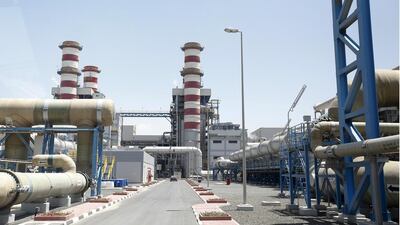No one who lives in or has visited the UAE needs to be told how much change the country has gone through in recent decades.
From the creation of Dubai’s Palm Jumeirah to the growth of Abu Dhabi city, the country has undergone a transformation barely matched anywhere on Earth.
The scale of that development, and its effect on the environment, is highlight in a new United Nations Environment Programme book, Arab Region Atlas of our Changing Environment.
It details the environmental changes and challenges facing the UAE and the other 21 members of the Arab League, including Syria, whose membership was suspended in 2011.
While these nations are as diverse as they are populous, with 352 million people spread across 9 per cent of the world’s land area straddling two continents, there is one key environmental factor that ranks as a concern almost across the board: water.
Water scarcity is classified as a key issue for 19 of these countries, with the region facing the most severe problems in the world.
When it is considered that anywhere with less than a million litres of available water a person a year is counted as being water scarce, the statistics for the Arab world are stark.
That figure is less than half a million litres in 70 per cent of the region, says Dr Mohamed Abdelraouf, a research fellow at the Gulf Research Centre in Dubai who is associated with the UN Environment Programme’s science and technology group.
There is also less than 250 millimetres a year of rain in 70 per cent of the Arab region, and less than 100mm a year in the GCC.
Lack of water is a key factor in two of the UAE’s main environmental challenges, land degradation and desertification, and threats to marine and coastal ecosystems.
When it comes to marine ecosystems, the extraction of water from the Arabian Gulf to desalinate for human consumption and agriculture is a key concern.
The GCC nations account for two in every 5 litres of water desalinated around the world. In 2011, UAE desalinated 1,700 billion litres, second only to Saudi Arabia’s 2,020 billion litres.
Yet as the population and economic activity of the Gulf increases, the amount of water desalinated is only set to grow. The UAE is planning facilities that will double its desalination capacity by 2030.
And desalination uses much energy, accounting for more than a quarter of the region’s electricity production, says Dr Mohamed Dawoud, manager of the water resources department at the Environment Agency Abu Dhabi.
The agency supports the Abu Dhabi Global Environmental Data Initiative, which helped to produce the atlas.
The warm, salty brine that flows from desalination plants back into the Gulf could also be harmful to its fragile marine ecosystem.
“The Gulf is a closed ecosystem,” says Dr Dawoud. “The renewal of the water is very slow because the flow of the water is very slow, and it’s very shallow.
“The increase in temperatures and increases of salinity affects the marine ecosystem — the coral reefs and fish.”
Another significant effect is on underground resources in water-holding aquifers. This has already become a major concern.
“Aquifers have been depleted dramatically in the last 20 years,” Dr Dawoud says. “Most have been depleted in quantity and quality. There is a lot of concern about the long-term and short-term sustainability.”
One of the biggest consumers of water in the region is agriculture, which according to the atlas uses as much as 80 per cent of the available water. Scientists are trying to find plants that are more tolerant of the region’s increasingly salty water.
But Gulf governments are not idle in the face of these challenges. Even as they invest heavily in new desalination plants, some of which will rely on solar power, they are pooling efforts to ensure water supplies are adequate by developing a common water network by 2020.
The scheme will coordinate the building of desalination plants and ensure common standards on desalination practices.
The greater desalination capacity will need to be complemented by measures to help manage use.
Dr Abdelraouf says an important factor will be rationalising water allocation between sectors such as agriculture, industry, households and tourism, based on variables such as the economic returns the various activities offer, and social considerations.
Just as carbon footprints have become widely understood and quoted, so may happen with water footprints, which measure the amount of water used or polluted over a given time for a particular activity.
“The water footprint will help improve the sustainability, efficiency and equitability of water usage in various sectors, businesses, products and processes, and also in different nations, regions and river basins,” says Dr Abdelraouf.
This leads to the concept of “virtual water” or “embedded water”, which measures the amount of water used to create a particular product.
It allows what Dr Abdelraouf describes as the “hidden flow” of virtual water to be measured when food or other commodities pass between nations.
This could help Arab countries to save water by importing more food that is water-intensive to produce.
“They can even produce food products or commodities that are not needed for their local consumption as long as they have a comparative advantage in their production,” said Dr Abdelraouf. “Then they can export these products to make sure they have enough revenues to import the water-intensive products.”
newsdesk@thenational.ae


